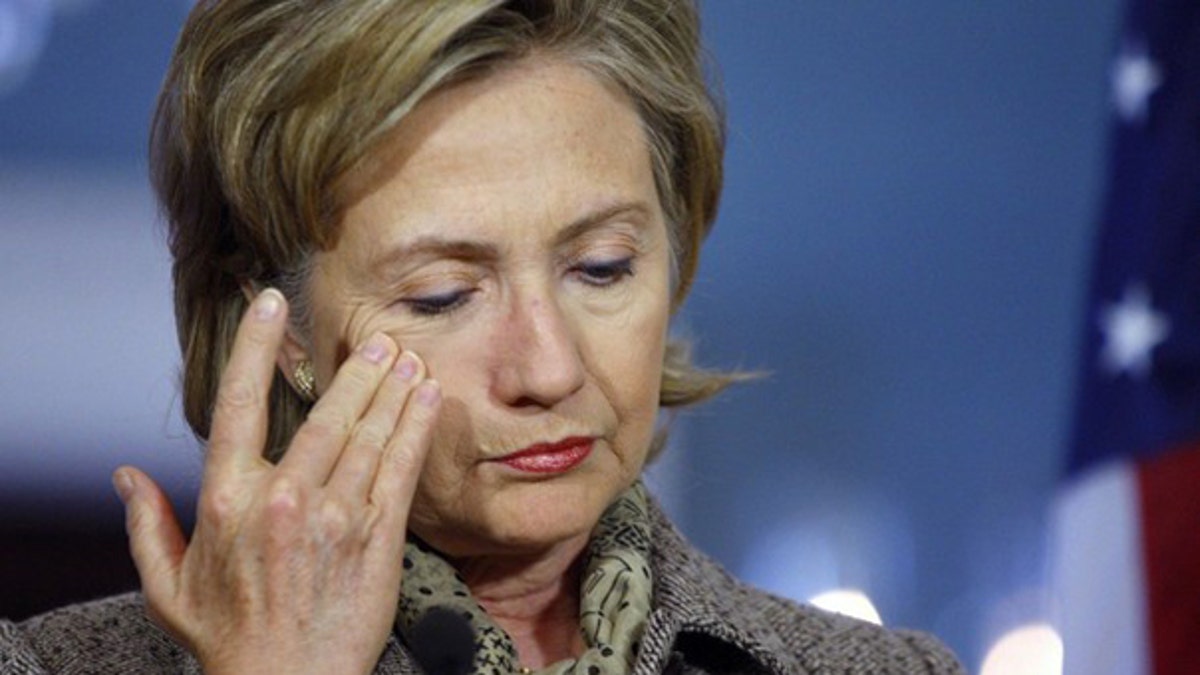
Hillary Clinton wipes her face during a press conference in Washington. (Reuters Photo)
In today’s world, there is little doubt the Web has become a weapon. Hackers and nation-states are using the Internet to spy on us, steal our innovation, and infect our critical infrastructure. But we also need to be concerned about the threat from within—from human failure here at home that makes our networks vulnerable.
Most astonishing, one of our own presidential candidates was an “insider threat” to the United States cybersecurity. Indeed, former Secretary of State Hillary Clinton’s “extreme carelessness” with classified information, as the FBI Director noted, put our country’s secrets in danger of theft by foreign adversaries.
This is no small matter. Our nation relies on the Secretary of State to conduct sensitive diplomacy on behalf of the American people. If he or she fails to protect official communications, foreign governments can uncover them and take advantage of us.
Hillary Clinton used more than a dozen different mobile devices during her time in office. State Department officials warned Clinton—and she was aware—that it was a serious risk to use her mobile phones abroad, especially in adversary nations. She even made this point in private speeches. Yet Clinton took her devices out of the country with her anyway.
The fact that Secretary Clinton put her own self-interest ahead of our security should alarm Americans.
The material on her devices included classified “Special Access Program” information—our nation’s top intelligence secrets. We also know, of course, that she used her own, relatively unsecure, homebrew server to store this sensitive data. Countries like Russia and China have the ability to launch cyber attacks on such unsecured devices, and there is a “high degree of confidence” that these programs are now in our adversaries’ hands.
Worse still, Clinton used these devices to communicate with the commander-in-chief, President Obama, while she was overseas—also putting the president’s messages at risk to theft by foreign spies.
This problematic threat to our national security was brought in front of Congress. The Senate Homeland Security and Government Affairs Committee found evidence suggesting there were attempted intrusions into Clinton's server by foreign governments, even after she stepped down as Secretary of State in 2013.
There is no getting around it: this kind of recklessness damages our national security and endangers our men and women serving our country overseas.
The fact that Secretary Clinton put her own self-interest ahead of our security should alarm Americans.
Our next president must be someone who can stand up to countries that hack into our networks—not someone who has been one of their soft targets.
President Reagan one asked, “Are you better off than you were four years ago?” But today they question is: are you safer than you were eight years ago?
I think most Americans would say they are not. In fact, we live in a much more dangerous world today than we did in 2008, largely because of President Obama’s actions and the architect of his failed foreign policy, Hillary Clinton.
Our allies no longer trust us, our adversaries no longer fear us, and our enemies are plotting against us.
America’s retreat from the world stage has created an array of power vacuums, which terrorists and rogue states have exploited to plot against us.
This did not happen by accident. It happened by design.
Americans have watched with deep concern, rightfully, as foreign adversaries like Russia have interfered in our democratic process through egregious hacks and leaks.
But the carelessness of officials like former Secretary Clinton only make it easier for Moscow to exploit our weaknesses.
We need to be treating “network security” as a matter of “national security”—and we need a president who has the common sense to do that.
Sadly, Hillary Clinton’s growing list of obfuscations and negligence related to her own cybersecurity practices gives us low confidence that she’s prepared to rise to the challenge.
